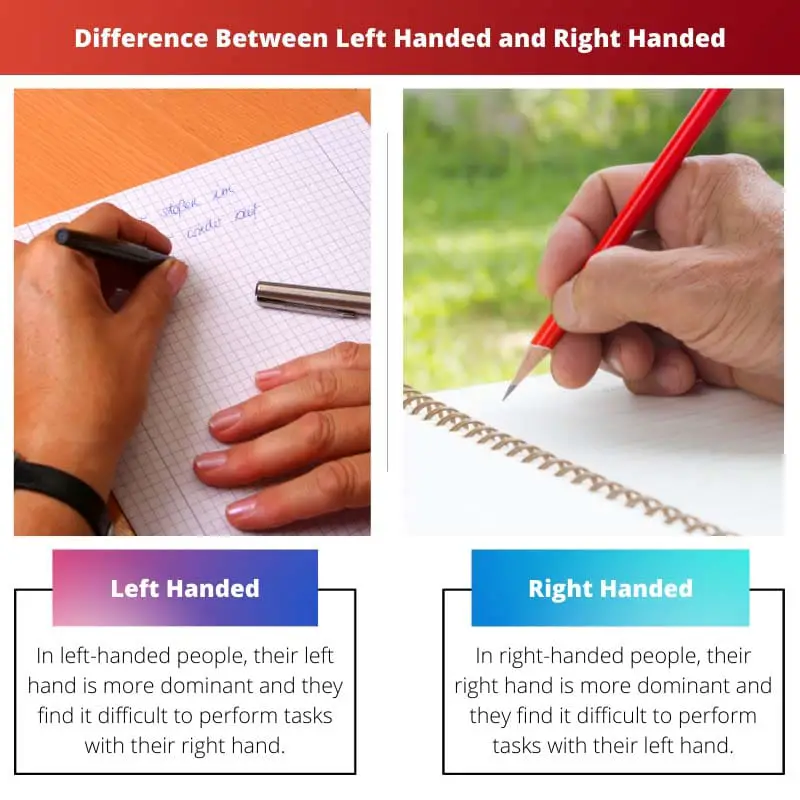Several types of research, studies, and arguments suggest different intellectual and creative levels in left-handed and right-handed people. While people used to believe that left-handed people are more intellectual, with due time, this theory has been proverb wrong. Though the right and left hemispheres of the brain respond differently for both handedness, there is no study to prove one is intellectually superior to the other.
Key Takeaways
- Left-handed individuals use their left hand for primary tasks, while right-handed individuals rely on their right hand.
- Right-handed people comprise approximately 90% of the population, with left-handed individuals accounting for the remaining 10%.
- Society and products cater to right-handed individuals, making certain activities more challenging for left-handed people.
Left Handed vs Right Handed
The difference between left-handed and right-handed people is that left-handed people use their left hand to do most the tasks like lifting, writing, eating, etc. Right-handed people use their right hand as the dominant hand most of the time. For left-hand people, some daily activities might get difficult that are made convenient for right-handed people, like zipping, swiping cards, etc.

Left-handed people comprise only 10% of the total world’s population. Left-handed people tend to show less brain lateralization, meaning that both sides of their brains show fewer differences. Since the population of left-handed people is very, very little, they were accused of being witches during middle age.
Right-handed people are dominant in the population, as they comprise 90% of the world’s population. Since right-handed are present in the majority, some certain activities or devices are designed according to them. For example, the mouse is always on the right-hand side in a computer lab.
Comparison Table
| Parameters of Comparison | Left Handed | Right Handed |
|---|---|---|
| Meaning | In left-handed people, their left hand is more dominant and they find it difficult to perform tasks with their right hand. | In right-handed people, their right hand is more dominant and they find it difficult to perform tasks with their left hand. |
| Population | About 10% population of the world are left-handed. | Right-handed people comprise 90% of our world’s population. |
| Health Risks | Left-handed people are more prone to diseases like dyslexia and ADHD. | Right-handed people are not prone to any disease due to their handedness. |
| Difficulties | Some everyday tasks like putting on a zipper, swiping credit cards, using computer mouses become difficult for left-handed people. | Right-handed people do not face any difficulty using or operating any devices. |
| Brain Lateralization | Left-handed people show less brain lateralization. | Right-handed people show more brain lateralization. |
| Ultrasound | Some experts say that ultrasound has effects on causing left-handedness. | Unborn right-handed babies are not affected by ultrasound. |
| Genetics | Left-handed parents are more likely to have left-handed children. | Right-handed parents don’t have much influence on the handedness of their children. |
What is Left-Handed?
The left-handed people suffered a lot during the Middle Ages as they were punished for thinking they were evil and practising witchcraft. Even during the 20th century, parents and teachers forced kids to switch from left to right hand as they thought it was some disease or disorder. Today, 10% of the world’s population is left-handed, and superstitions have vanished with time.
The difference between left-handed and right-handed people has caused much research and studies, and a new conclusion arrives every time. Many people believe that left-handed people are more intellectual or that their creative side is more dominant, but no experiment has proven it so far. Since many US presidents were left-handed, it got people thinking that they had better leadership qualities.
Several studies have concluded that left-handed people are more prone to diseases like dyslexia and ADHD. Many studies are still going on to understand the genetics behind left-handed people. There are more than one genetic factors that are responsible for causing left-handedness. But, even if a child is left-handed during birth, their upbringing or training to make them right-handed can change the dominant hand.

What is Right-Handed?
In right-handed people, the left side of the brain dominates as this side is responsible for controlling the right leg, hand, eye, etc. Many scientists perform studies to understand how ancestors became primarily right-handed even before humans arrived. Evidence from 1.5 million years ago shows that Homohabilis and Home erectus showed right-handedness.
One of the most common theories for right-handedness is brain lateralization which was further caused by vocalization. Cerebral asymmetry for speech is a process of evolution. When people started to use sounds and words to communicate, their hands were relieved from making gestures and thus more available for work like hunting and tool making. A study by McManus (1999, 2002) suggests that left-handedness is a result of mutation.
Today, 90% of the world’s population is right-handed. Evolution has caused our brain to differentiate activities and allot a specific side of the brain for that. But, studies show that the right-handed preference for manual actions are developed in fetus within 15 weeks as they start sucking their right thumb.

Main Differences Between Left Handed and Right Handed
- In left-handed people, their left hand is more dominant, and in right-handed people, their right hand is dominant.
- About 10% of the world’s population is left-handed, whereas the rest, 90%, are right-handed.
- Left-handed people are more prone to diseases like dyslexia and ADHD, whereas handedness doesn’t have that influence on right-handed people.
- Some everyday tasks like putting on a zipper, swiping credit cards, and using a computer mouse become difficult for left-handed people but not for right-handed people.
- Left-handed people show less brain lateralization, whereas right-handed people show more brain lateralization.
- Some experts say that ultrasound has effects on causing left-handedness, but it doesn’t have any effect on causing right-handedness.
- Left-handed parents are more likely to have left-handed children, whereas right-handed parents don’t have much influence on the handedness of their children.

- https://psycnet.apa.org/record/1978-00208-001
- https://science.sciencemag.org/content/198/4317/631.abstract

The article provides a comprehensive understanding of the differences between left-handed and right-handed individuals, with a detailed comparison of the percentage of the population, associated health risks, and social implications. It’s an insightful read.
The historical background on how left-handed individuals were treated and perceived during the Middle Ages is particularly interesting. It’s important to acknowledge these past misconceptions and superstitions that have been debunked over time.
The article effectively highlights the subtle challenges faced by left-handed individuals in a world that predominantly caters to right-handed people. The section on brain lateralization and its differences between left and right-handed individuals is thought-provoking.
This article is an excellent resource for understanding the physiological and historical dimensions of handedness differences. The comprehensive comparison table provides a clear overview of the disparities between left-handed and right-handed individuals.
The article effectively debunks historical myths about left-handed individuals and instigates a critical discussion around the prevalence, challenges, and advantages of left-handedness. The evolutionary perspective on right-handedness is particularly intriguing.
The analysis of brain lateralization, ultrasound effects on handedness, and the influence of genetics provides valuable insights into the topic. It’s commendable how the article has covered multifaceted aspects of this subject.
The genetic implications for left-handedness and the ongoing studies to understand the underlying factors are intriguing. It points towards the complexity of human traits and the influence of genetics on handedness.
The scientific studies mentioned in the article provide a nuanced understanding of the differences between left-handed and right-handed individuals, offering a holistic view of genetic, historical, and social factors. It is fascinating to explore these intersections.
I completely agree, the article presents a well-researched and balanced perspective on the topic, highlighting both the advantages and challenges associated with being left-handed or right-handed.